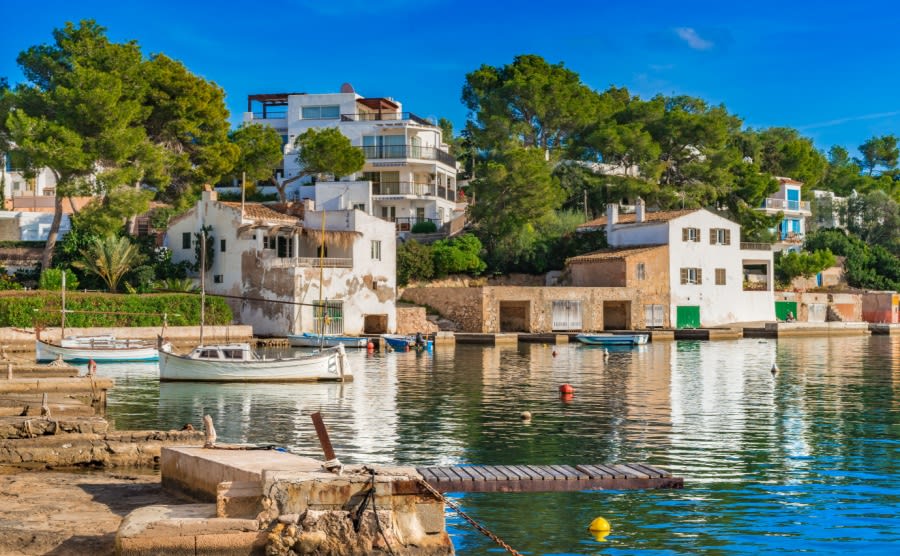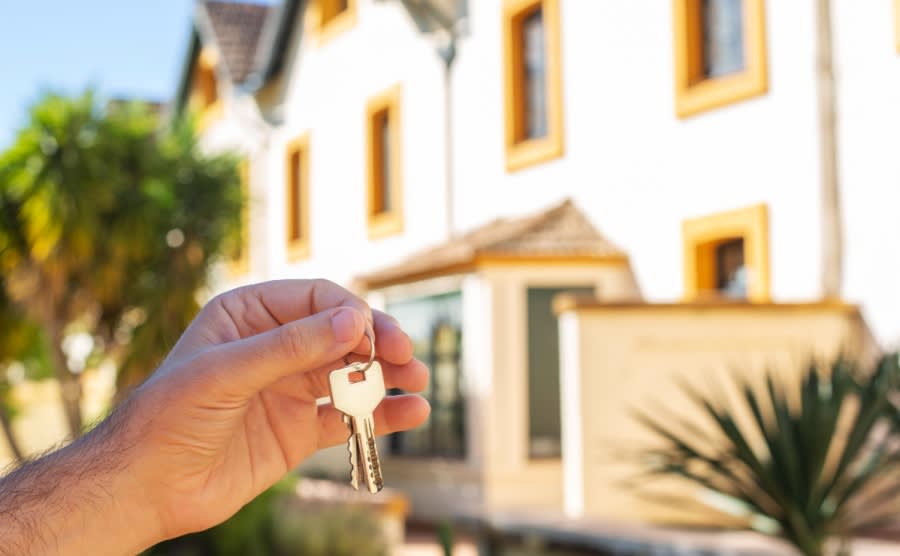Purchasing a property overseas is an exciting prospect, whether you’re looking for a holiday home on the Mediterranean, planning a retirement to the sun or looking to expand your investment portfolio. However, navigating the process can be complex, with legal, financial and logistical challenges to overcome.
This guide will take you through each step of buying a property overseas, helping you avoid common pitfalls and manage currency risks effectively.
Bear in mind that you don’t have to go through the process alone. Smart Currency Exchange and our partners at Your Overseas Home are experts in buying property abroad, with decades of experience. We’re at the end of the telephone to help answer any questions you may have or to put you in touch with legal and property experts at every stage of your journey.
Buying their dream property abroad is a journey that thousands of people complete every month, and you can too. Let’s go!
Step 1: Decide on your destination
The first step in buying property abroad is choosing the right country and location. Most of us instinctively know, from many happy holidays, which country we wish to buy a holiday home in or retire to.
However, there are limitations on how you can use a property in some countries, especially within the European Union for buyers from countries outside it. For investors, too, different countries will have a different appeal. So it is important to speak to a property or immigration expert before you commit to buying a property purchase, to ensure you are allowed to use it how you wish.
Consider factors such as property prices, accessibility, local healthcare, residency requirements and lifestyle before making a decision.
Research the legal and financial requirements
Every country has its own property laws and tax systems. To avoid legal pitfalls, ensure you:
- Hire an independent, English-speaking lawyer who specialises in international property transactions.
- Understand property ownership laws, inheritance rules, and tax implications in your chosen country.
- Check for any restrictions on foreign buyers and necessary permits or visas.
How Smart Currency Exchange helps
Exchange rates fluctuate constantly, which can impact your buying power. Using a currency specialist ensures you get the best rates and can lock in an exchange rate for future payments, protecting your budget from currency volatility.
European Union (EU) restrictions
For the 27 countries of the EU, apart from Ireland which for UK buyers is governed by the Common Travel Area, UK citizens are limited to staying there for 90 days in every 180. To stay beyond that they will need a visa. For retirees this is fairly straightforward (see The Easiest Place to Retire Overseas) but for working people more complicated. You may, however, be able to buy a property or other investment and get a “golden visa”.
Popular choices for UK buyers include:
Spain
A favourite for its warm climate, affordable property and well-established expat communities. Travel is easy from the UK all year round, with flights to many regional airports. Post-Brexit worries have largely melted away, with retirement and other visas relatively easy to obtain and the British still the largest cohort of buyers from abroad.

Cala d’Or, Mallorca
France
Ideal for countryside retreats and coastal properties, France has strong legal protections for buyers. A wide range of property includes highly affordable cottages in Normandy or Brittany to more pricey properties on the Riviera to ski property in resorts such as Courchevel.
Portugal
Fun fact, Portugal’s 1373 military alliance with England is the oldest in the world. The two countries are firm friends and Portugal extends a warm welcome to British buyers with easy visas and tempting tax schemes. The Algarve attracts retirees for its sunshine and relaxed lifestyle while Porto, Lisbon and Madeira are firm favourites for digital nomads.
Italy
Famous for its rich culture, history and stunning landscapes all the way from Lake Como in the north to Sicily in the south, via Tuscany, Italy is a top choice for holiday home buyers. Property options include farmhouses, seaside villas and apartments in cities such as Rome, Milan or Florence.
Greece
The glamour of expat life in Greece has featured in Mamma Mia! and The Durrells, and property here is highly affordable, even in Athens. You have enormous choice throughout its 200+ inhabited islands and mainland, where a white sand beach and welcoming taverna is rarely far away.
Cyprus
With English spoken by most people and long ties to the UK – they even drive on the left! – Cyprus offers a flavour of home combined with a warm Mediterranean welcome within reach of Central Europe, the Middle East and North Africa.
USA
While plenty of British people find exciting work and lifestyles in New York City and California, the top choice for property buyers tends to be Florida. With sunshine and theme parks contributing to its year-round appeal, Americans speaking English is a big plus for many buyers and buying costs tend to be cheaper.
Step 2: Set a realistic overseas property budget
We’ve probably all gazed into estate agent windows abroad and wondered about buying. Homes can seem much lower than in your own area, but do bear in mind the extra costs involved.

Hidden costs can add up
Beyond the property’s price, consider additional costs such as:
- Property buying taxes
- Legal and notary fees
- Surveyor costs
- Translation costs if applicable
- Utility connections and ongoing maintenance
A rule of thumb is that in most Mediterranean countries you will need to find between 10% and 15% on top of the purchase price.
While buying costs can be lower in countries with similar legal systems to the UK, such as Australia, New Zealand and Canada, property prices are higher and there tend to be stricter controls on international buyers. Read more at Propertyguides.com.
How Smart Currency Exchange helps
Setting a budget
Speak to Smart Currency Exchange before planning your budget. The ‘interbank rate’ you will see on the news is not available to property buyers, but Smart Currency Exchange will get you as close as possible.
The rate will depend on the amount and your timescale, so call or email us today for your currency quote.
Step 3: Secure financing and mortgage
There are essentially two ways to raise the cash money for a property purchase: your own money or borrowed funds. Most buyers opt for a bit of each.
Your own money might include savings, your pension lump sum payment or selling existing investments.
When it comes to borrowing money, you have a range of options, including:
- Overseas mortgages – Available in countries like Spain, France and Portugal. Bear in mind that for non-resident buyers you will normally require a larger deposit than in the UK.
- UK-based mortgage lenders – Some offer international mortgages, but rates and terms can vary. Also consider equity release schemes and retirement mortgages.
Seek advice from an independent mortgage broker to explore the best financing options.
Step 4: View properties and make an offer
While online listings provide a good starting point and great way of narrowing your selection, most buyers prefer visiting properties in person before committing.
Get your team in place
You will need to employ certain professional services to buy a property overseas, just as you would at home. The most important, after your currency broker, a property lawyer. It’s safest to engage a lawyer before you have viewed homes, and certainly before signing any contracts.
They should speak your language and be expert in property services – and many immigration too if you plan moving to the country.
You might also want to hire an independent financial adviser at this stage, as how and when you buy can affect your finances.
Some buyers also choose to employ a surveyor, although this is not as common in some other countries as in the UK.
Planning your trip
When you have found some properties online, make enquiries via the portal to start a dialogue with the agent. Discuss your requirements, budget and timescales and see if they have any more potential properties. They can email these to you before your trip for approval. Your time is limited on these trips, so put your faith in their knowledge and avoid unnecessary stress.
Discuss the best time to go. Avoid public holidays – theirs, not yours! – and few agents work on Sundays. The height of summer may not be the best time to go, but the agent will advise on this.
Independent or with the agent?
Some estate agents will help with your trip. They may offer deals covering accommodation costs and even put you up in a hotel. They will certainly ferry from your accommodation to the properties. However, the risk is that your itinerary will then be dictated by them, so you may choose to be best to be entirely independent.
Either way, your viewing trip should include:
- A tour of the neighbourhood
- Advice on access to amenities, healthcare and transport
- Help with any initial paperwork, such as the NIE in Spain.
Once you find the right property, you will normally make a formal offer through your agent. If the negotiation is successful, you will often be asked to pay a reservation deposit to lock in the offer.
You should speak to your lawyer before you sign or pay anything, but this may not be refundable if you simply change your mind.
How Smart Currency Exchange helps:
Prepare for your viewing trip by opening a no-obligation account with Smart Currency Exchange. You can prefund you account so that if you see the property you want, you can secure the transfer of funds for a reservation deposit.
Step 5: Conduct due diligence and sign contracts
Across the world there are all sorts of different scenarios and buying processes. It will be different, for example, if you are buying off plan, or are willing to go straight to completion.
However this is a typical process for most buyers. Before the 15 to 30 days set out on the reservation agreement have run out, you will be asked to sign the deposit contract. This commits you to buying the property and the seller to sell it to you.
This is a key part of the legal process of buying a home in Spain, where it’s called the contrato de arras. There is no chance of gazumping like in the UK. In Portugal it’s the contrato de promessa de compra e venda (promissory contract). In Italy the contratto preliminare (preliminary contract),
Your lawyer will guide you through the legal process, ensuring all paperwork is in order before signing the purchase contract. They will be ensuring two essential matters:
- That there are no outstanding debts or claims on the property
- That the title is clear and registered in your name
At this point you may decide to get a property survey completed (especially in rural areas).
Step 6: Complete the purchase and transfer funds
On completion day you will make the final payment and ownership will be transferred to you. In many countries, particularly in France, Spain, Italy and other European countries, this will happen at the notary’s office.
Bear in mind that the notary is a government official, there to check that the purchase fulfils all legal obligations to the state, that the taxes are paid and the property change registered. They are not your lawyer and are not looking after your interests.

It’s yours!
Final thoughts
Buying a property overseas is a significant financial commitment. But with the right guidance and planning, it can be a dream come true.
Avoid common mistakes by working with independent professionals and managing currency risk through Smart Currency Exchange. With expert support at every stage, you can confidently secure your ideal overseas home without unexpected financial surprises.





















